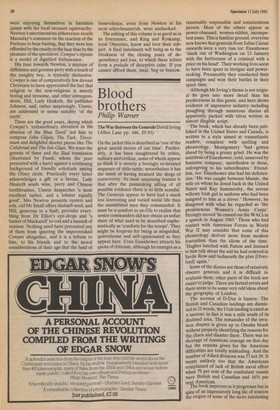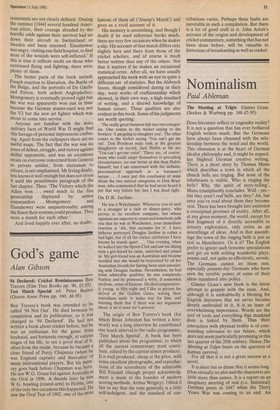Blood brothers
Philip Warner
The War Between the Generals David Irving (Allen Lane pp. 446, £9.95) On the jacket this is described as 'one of the great untold stories of our time'. Predictably, it has been slaughtered by critics, military and civilian, some of whom appear to think it is merely a boringly re-iterated sequence of tittle-tattle; nevertheless it has the merit of having strained the dregs of controversy. Its most surprising feature is that after the painstaking sifting of all possible evidence there is so little scandal. The Generals appear to have had a much less interesting and varied social life than the uninhibited men they commanded. It must be a comfort to ex-GIs to realise that senior commanders did not obtain an unfair share of what used to be described euphemistically as 'comforts for the troops'. They might be forgiven for being as misguided, quarrelsome and self-opinionated as they appear here. Even Eisenhower attracts his quota of criticism, although he emerges as a reasonably responsible and conscientious person. Most of the others appear as power-obsessed, women-ridden, incompetent asses. This is familiar ground, everyone now knows that generals from Julius Caesar onwards were a very rum lot: Eisenhower 'slunk out of Washington on 13 January with the furtiveness of a criminal with a price on his head'. Their working lives seem to have been spent in intrigue and powerseeking. Presumably they conducted their campaigns and won their battles in their spare time.
Although Mr Irving's theme is not original he goes into more detail than his predecessors in this genre, and here shows evidence of impressive industry including ploughing through numerous diaries all apparently packed with trivia written in almost illegible script.
The book, which has already been published in the United States and Canada, is written in a style aimed at transatlantic readers, complete with spelling and phraseology. Montgomery `had gotten ahead by being a greasy grind. He was the antithesis of Eisenhower, cold, unmoved by feminine company, unorthodox in dress, unforgiving to his subordinates.' Friendless, too. Eisenhower also had his deficien cies. was caught between Mamie, the wife on whom he doted back in the United States and Kay Summersby, the serene willowy Irish girl in uniform who had been assigned to him as a driver.' However, he disagreed with what he regarded as 'the promiscuous Women's Army Corps'. Strongly moved 'he cussed out the WACs in a speech in August 1943.' Those who had contact with American Forces in World War II may consider that some of this phraseology derives more from modern journalism than the idiom of the time. 'Hughes lunched with Patton and listened to him talk about the suit he had ordered in Savile Row and badmouth the plan [Overlord] again.'
Some of the diaries are those of relatively obscure generals and it is difficult to evaluate them; other parts of the book are easier to judge. There are factual errors and there seem to be some very odd ideas about the geography of London.
The account of D-Day is bizarre. The British and Canadian landings are dismissed in 21 words, the Utah landing is rated as a success; in fact it was a mile south of its destined area. The remainder of the invasion chapter is given up to Omaha beach without properly identifying the reasons for the chaos and disaster there. There was no shortage of American courage on that day but the reasons given for the American difficulties are totally misleading. And the number of Allied divisions was 37 not 39. It seems unlikely too that the Americans complained of lack of British naval effort when 79 per cent of the combatant vessels were British and Canadian and 161/2 per cent American. The book improves as it progresses but in spite of an impressively long list of sources the origins of some of the more interesting statements are not clearly defined. 'During the summer [1944] several hundred American pilots, their courage abraded by the horrific odds against their survival had set down their aircraft in Switzerland or Sweden and been interned. Eisenhower was angry, visiting one field hospital, to find most of the wounds were self-inflicted.' If this is true it reflects credit on those who continued flying and fighting; there were plenty of them.
The better parts of the book include French reaction to liberation, the Battle of the Bulge, and the portraits of De Gaulle and Patton, both ardent Anglophobes. Montgomery is eventually proved right but the war was apparently won just in time because the German master-card was not the V2 but the new jet fighter which was about to come into service.
Anyone not familiar with the main military facts of World War II might find this farrago of personal impressions confusing. Apart from the endpapers there are no useful maps. The fact that the war was six years of defeat, struggle, and victory against skilful opponents, and was an enormous strain on everyone concerned from General to private soldier, from statesman to citizen, is not emphasised. Mr Irving doubtless knows it well enough but does not stress it until the penultimate paragraph of the last chapter. Then: 'The Victory which the Allies won. . . owed much to the fine generalship displayed by senior commanders . . . Montgomery and Eisenhower were unquestionably among the finest their systems could produce. They were a match for each other.'
And lived happily ever after, no doubt.



































 Previous page
Previous page